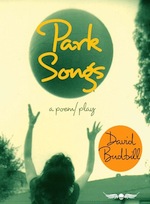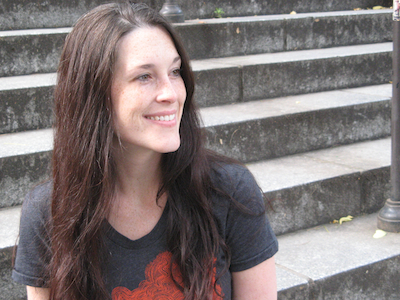An introduction to David Budbill, author of the book Park Songs: a Poem/Play (Exterminating Angel Press, 2012). Happy Life, his most recent book of poems, was published by Copper Canyon Press in 2011. Two other Budbill books have also been published by Copper Canyon Press, While We’ve Still Got Feet and Moment to Moment: Poems of a Mountain Recluse. His latest play, A Song for My Father, premiered at Lost Nation Theatre in Montpelier, Vermont, in the spring of 2010 and will be produced again in Salinas, California, at The Western Stage in 2013. Budbill’s prizes and honors include The Vermont Arts Council’s Walter Cerf Award for Lifetime Achievement in the Arts, a National Endowment for the Arts Play Writing Fellowship, a Guggenheim Fellowship in Poetry, and The Dorothy Canfield Fisher Award for Fiction. When asked about the role of humor in Park Songs, Budbill said, “All I know is, I can’t live my life without humor and neither can my characters.”
Quick Facts on David Budbill
- David Budbill’s website
- Home: The southwest corner of Vermont’s Northeast Kingdom, five miles from blacktop and 35 miles from a traffic light in any direction of the compass.
- What’s your comfort food: Spaghetti and red sauce with a couple of glasses of red wine.
- Top reads: Ryokan, Han Shan, Wang Wei, Po Chu-i, and Wendell Berry
- Current reads: Two books by Ryokan, in translation.
What are you working on at the moment?
More poems for my next book of poems from Copper Canyon Press.
Where did the idea come from for Park Songs?
It started with a play years ago called “Little Acts of Kindness” that ran in Montpelier, VT, in 1993. I’ve generally changed things from that original production, added some characters, rewritten others—the usual tinkering and rewriting that any writer does. And before the play they were monologues spoken by characters in my imagination.
What do you hope readers will take away from this book?
“I am always interested in the down-and-out,
the forgotten people, the disenfranchised.”
I hope that people, readers or theatregoers, take away a sense of these characters, their lives and the situations they are in in the world. I am always interested in the down-and-out, the forgotten people, the disenfranchised. I want readers or theatregoers to remember these characters.
Whom do you picture as the ideal reader of your work?
Anybody who has some compassion and sympathy.
Where and when do you prefer to write?
Here at my desk in my room upstairs in my house here at home.
Where would you most want to live and write?
Right here where I am right now. I love it here and I don’t want to work anywhere else.
Do you listen to anything while you write?
No. When I listen to music, I listen. And I don’t talk while the music is playing. I talk after the music stops. Music is a conversation in another language; it is someone speaking directly to you, and, as your mother must have told you, it is impolite to talk while someone else is speaking.
How does blues music fit in with Park Songs?
“The blues can bring you up as well as down.”
I’ve been a jazz and blues fan since I was 12, that’s exactly 50 years ago. Blues seems like the natural music of the people in Park Songs, and not only because the Blues is sometimes sad—such as the lyrics to the blues tune I wrote called “The Life Hurts Blues”—but also because the blues can bring you up as well as down. The blues can release in you powerful feelings of sadness, foreboding and grief, and in the process, it can make you feel better, refreshed, lighter, even happier.
Do you have a philosophy for, or an approach to, how and why you write?
No. I just listen to the voices both inside of me and outside of me and try my damnedest to write down what they say.
What do you find most challenging about writing?
Getting down right what I want to say. I think there is a kind of platter circulating in myself somewhere, maybe it’s my head, maybe not. And on that platter are all the poems and characters that appear to me. They are constantly circulating inside of me. I’ve got to catch them when they come around. If I miss them, well, too bad for me, I just wasn’t quick enough or skilled enough or something to catch them. And when they come around again they might not be the same thing or be saying the same thing.
When you’re having trouble getting started on a poem, where do you look for inspiration?
I go for a walk in the woods, or I play some music to take my mind entirely off what I was trying to do.
How have your goals as a writer changed over time?
I have no idea. I never think about such things. Do I have goals? If I do, they are probably the same ones I had 30 or 40 years ago, and I’ve spent the last 30 or 40 years trying to get to those goals.
Is there a quote about writing that motivates or inspires you?
Here’s one I made up: “Don’t think. Listen.”
And my all-time favorite quote is from Ornette Coleman: “Most whites tend to think that it’s below their dignity to just show suffering and just show any other meaning that has to do with feeling and not with technique or analysis or whatever you call it.”
What advice would you give to aspiring writers?
Write something every day, even if it’s a grocery list. Use the language every day.
What’s the best advice you’ve been given as a writer?
“Don’t think. Listen.”
Don’t think. Listen.
Is there a question you find surprising that people ask you about your work?
Yeah. They ask me where it comes from. It comes from out of nowhere, from my imagination, from the voices I hear, from somewhere. In short, I don’t know where it comes from, and I don’t care.
When you’re not writing, what do you like to do?
Cut wood, garden, play music, ride my mountain bike, watch TV.
About David Budbill
David Budbill has worked as a carpenter’s apprentice, short order cook, Christmas tree farm day laborer, mental hospital attendant, church pastor, teacher, and occasional commentator on NPR’s All Thing Considered. He is also the award-winning author of twelve books of poems, six plays, a novel, a collection of short stories, an opera libretto, and a picture book for children. His books include the bestselling Happy Life (Copper Canyon Press) and Judevine, a collection of narrative poems that forms the basis for Judevine: The Play, which has been performed in 22 states. Budbill was born in Cleveland, Ohio and now lives in the mountains of northern Vermont. David Budbill’s newest book of poems is Park Songs: a Poem/Play published by Exterminating Angel Press (2012).
Buy Park Songs, preferably at your local independent bookstore.
[Toffoli, Marissa B. “Interview With Writer David Budbill.” Words With Writers (October 7, 2012), https://wordswithwriters.com/2012/10/7/david-budbill/.]

Park Songs by David Budbill (Exterminating Angel Press, 2012).




[…] Sebastian (2011) Behm-Steinberg, Hugh (2010) Bell, Virginia (2013) Budbill, David (2012) Day, Lucille Lang (2014) Doyle, Caitlin (2011) Drewes, Steffi (2010) Duggan, […]
[…] go to: https://wordswithwriters.com/2012/10/07/david-budbill/ […]
[…] On Words With Writers […]